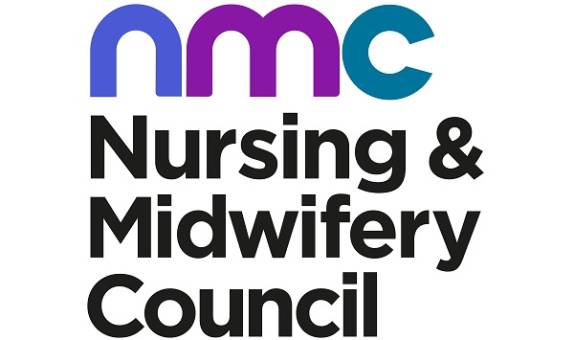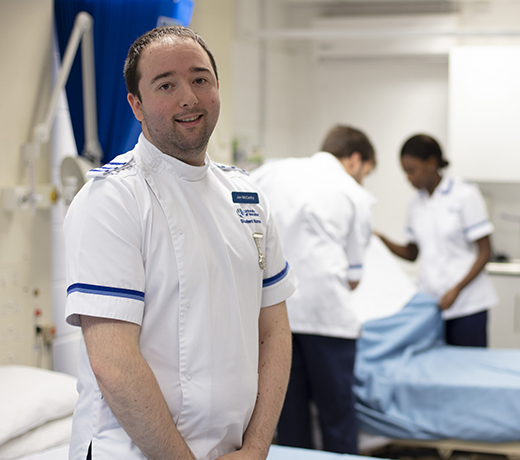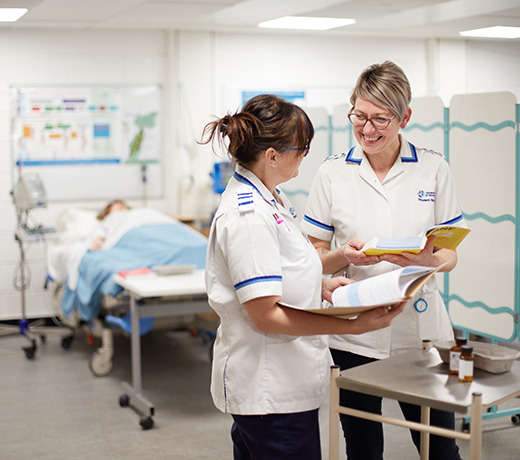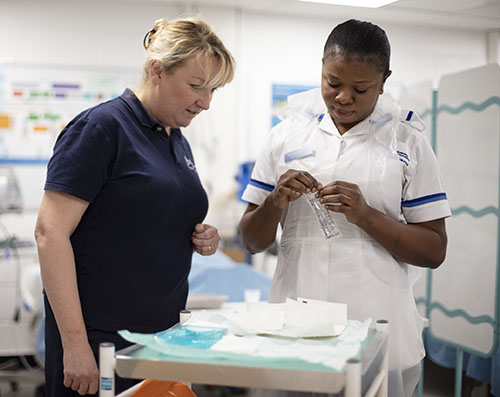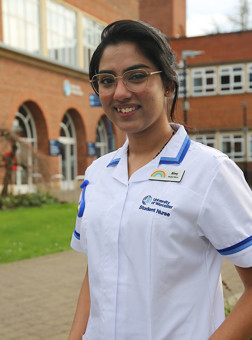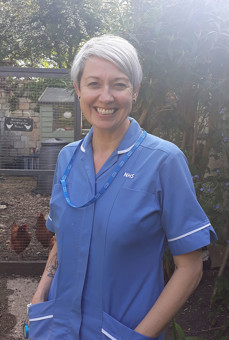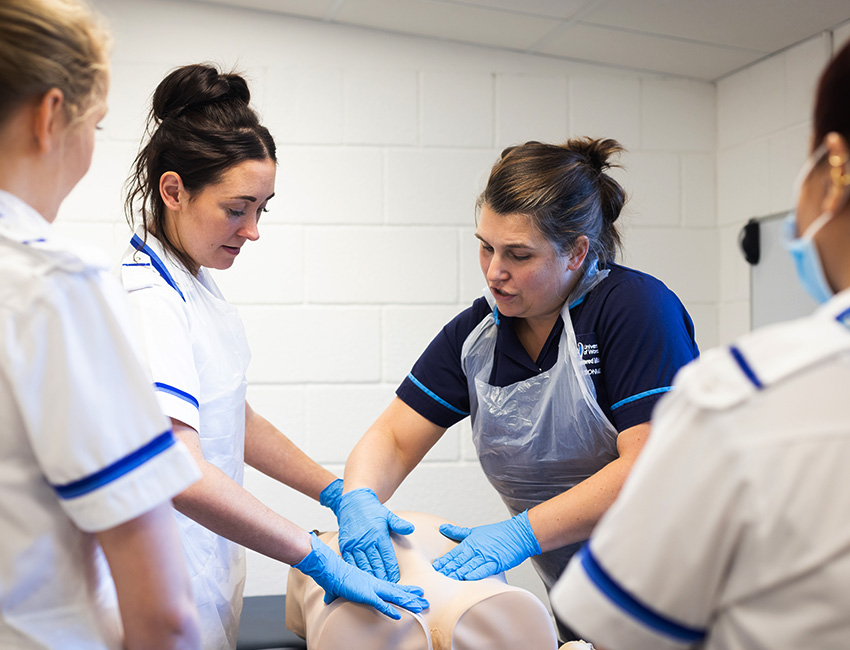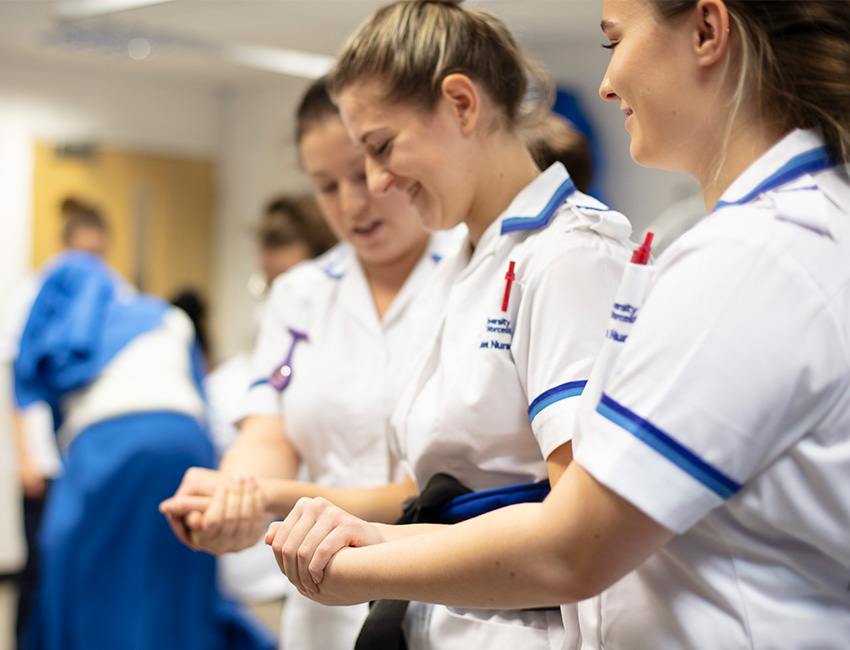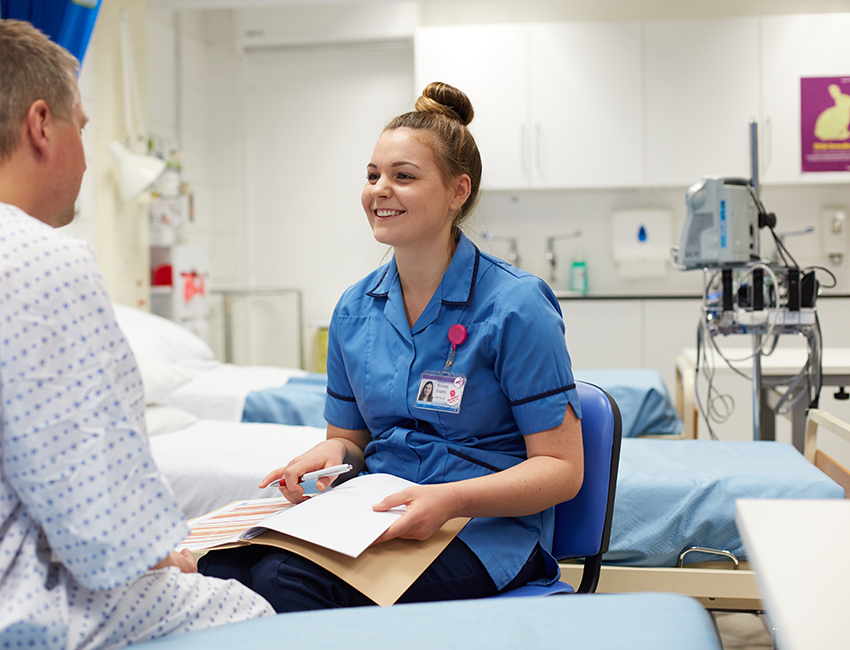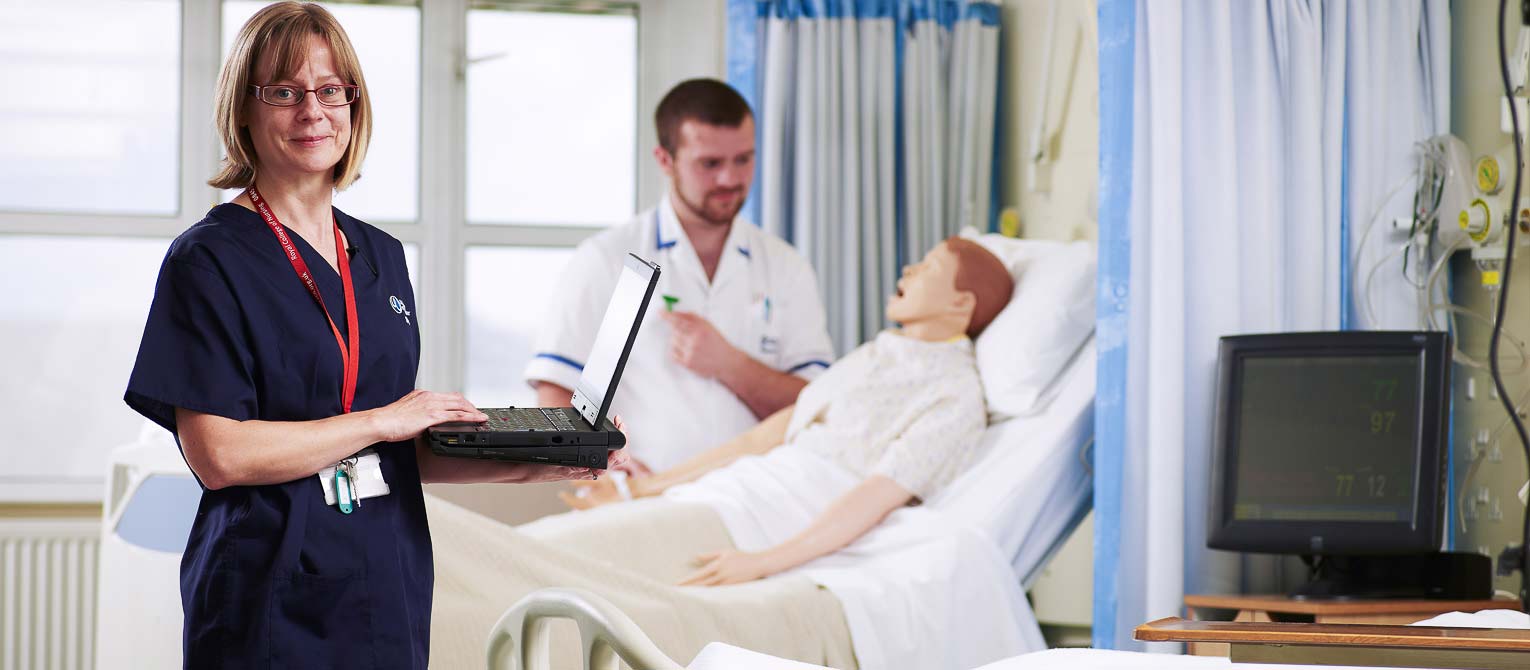Our nursing degree is split between learning on campus and developing your skills on placements across the midlands region. Throughout the course you’ll develop the clinical skills, knowledge, compassion and confidence to thrive as a registered nurse.
grant that you won't need to pay back
With this degree you’ll be eligible to register as a nurse with the NMC, the professional regulatory body for nurses.
University of the Year finalist
Recognised for our graduate success, we’re shortlisted for University of the Year in the Times Higher Education Awards 2025.
Overview
At Worcester we have an excellent reputation for training registered nurses. Our BSc (Hons) Nursing course offers a comprehensive and diverse curriculum that prepares you for the emotional, psychological, and practical demands of the profession. You'll learn to become an articulate, flexible, decision maker who is able to promote health and well-being, prioritise effective care and implement evidence-based nursing practice.
Lecturers get to know your strengths and where you can develop, offering personalised support and feedback throughout your course. When you start, you’ll also be assigned a Personal Academic Tutor. Usually this is one of the people teaching on your course and they typically remain with you throughout your adult nursing degree.
You’ll learn alongside students from other healthcare courses, helping you understand how professionals work together to care for patients. This helps you understand the roles and responsibilities of different professionals and prepares you for collaborative practice in real-world healthcare settings.
Alongside seminars, lectures and one-to-one tutorials you’ll also have lots of skills session to prepare you for placement. These hands-on sessions take place in our simulation suites, which replicate the hospital and community facilities you’ll be working in when you graduate. You’ll practice different techniques and decision making scenarios with a range of simulation manikins, and learn about person-centred care with real service users and experienced nurses.
Placements
Our aim is to arrange placements and visits to a diverse range of settings during your three years on the course, so you’ll care for a range of people, in lots of different environments. We have excellent links with NHS Trusts and healthcare providers in the region, including:
- Worcestershire Acute Hospitals NHS Trust
- Herefordshire and Worcestershire Health & Care Trust
- University Hospitals Birmingham NHS Foundation Trust
- The Dudley Group NHS Foundation Trust
- Wye Valley NHS Trust
- Gloucestershire Hospitals NHS Trust
- Shrewsbury and Telford Hospital NHS Trust
Around half your time will be spent on practice placement in each year of the adult nursing degree. Your placements run in blocks across the year, normally with experiences in at least two different placement settings each year.
While out on placement you’ll learn from experienced nurses and have lots of support from your tutors. These practical experiences, in combination with your time on campus, prepare you to be a skilled, compassionate and confident adult nurse.
Placement opportunities span a wide range of healthcare environments, including hospitals, community services, and specialist care settings. You’ll gain hands-on experience with diverse patient populations and healthcare needs.
There are also opportunities for community engagement and international placements, giving you the chance to explore healthcare delivery in different cultural and social contexts.
Nursing in 60 seconds
Course content
On this accredited course you’ll study theories backed up by substantial evidence, and then get the opportunity to apply this learning in professional practice.
We regularly review our courses to reflect the latest research and developments in the subject area, as well as feedback from students, employers and the wider sector. As a result, modules may change to ensure the course remains current and relevant.
All modules are mandatory in your first and second year to ensure you’re eligible to register as a nurse with the NMC.
Careers
This course will prepare you for registration with the Nursing and Midwifery Council, so you can begin a rewarding career in adult nursing.
Most of our graduates go on to work in the NHS – but others find positions in private practice, social services, schools, the prison service or choose to work overseas.
In your final year we arrange mock interviews and CV writing workshops, and your personal academic tutor will support with career planning. We also invite employers in the region on to campus to meet you and discuss career opportunities. Our excellent reputation in the midlands region means that most of our graduates go on to work for local NHS trusts, often securing a job before they graduate.
Opportunities
Once you’ve qualified as an adult nurse, you could choose to specialise in a certain field such as operating theatres, drug rehabilitation, care for the elderly or intensive care.
With experience you could become a nursing sister, ward manager, team leader, or move into a management role like matron or director of nursing.
With future qualifications you could become an advanced nurse practitioner, clinical nurse specialist or nurse consultant. Or you may want to move into public health, teaching or clinical research. An adult nursing degree opens up lots of possibilities.
Course highlights
Teaching and assessment
Teaching is a mix of interactive seminars, lectures, one-to-one tutorials and practical skills sessions. Your assessments will help prepare you for a career as a nurse, and include observations of professional skills, writing reflective essays, presenting, group discussions and creating a care plan.
Teaching and assessment contents
Theory
Theory teaching is delivered through a structured programme informed by constructivist, experiential, and transformative learning principles, ensuring that students actively engage with content and apply knowledge in authentic contexts. Theory teaching is delivered in the following formats:
- Lead Lectures: Delivered both on-campus and synchronously online, lead lectures introduce foundational concepts to students. In core modules, lead lectures are delivered to all students and introduce nursing knowledge and ideas that are applicable across all fields of nursing practice. In field-of-practice modules, lead lectures focus on more specialist underpinning theoretical concepts for each field of nursing practice.
- Seminars: Delivered both on-campus and synchronously online, seminars are delivered in smaller field of practice/mixed field groups that enable students to contextualise theoretical content within their chosen field of nursing practice, or develop holistic skills to provide care to all individuals. Seminars use smaller group activities to engage in dialogue, debate, and reflection to encourage deeper understanding and critical thinking. Seminar-based learning is aligned with constructivist learning principles.
- Workshops: Interactive workshops which are delivered both on-campus and synchronously online. Workshops are delivered in field of practice/mixed field groups and use interactive, case-based and problem-based learning approaches, allowing students to apply theory to practice and develop clinical reasoning skills in a structured and interactive learning environment. Workshop activities facilitate learning grounded in experiential learning practices.
- Guided learning: Hybrid asynchronous-synchronous activities, delivered online and hosted via the specific module Blackboard Ultra pages. Guided learning tasks reinforce taught content and support the development of academic skills and insight into learning to learn. Guided learning activities are structured tasks that support heutagogical learning principles that encourage autonomy and lifelong learning. Guided learning activities are time-bound and tutor monitored, distinguishing them form self-directed and independent learning.
- Online directed asynchronous learning: Delivered through Blackboard Ultra, directed learning refers to activities delivered online, including discussion boards, quizzes, and reflective journaling.
- Independent learning: Independent self-study is designed to develop critical thinking and academic autonomy, support heutagogy, and prepare students for lifelong learning and professional development. It is supported by a range of excellent learning facilities, including the Hive and library resources, the virtual learning environment, and extensive electronic learning resources.
Practice Learning
Practice learning is central to the BSc (Hons) Nursing programme and is underpinned by experiential learning theory and social learning principles, ensuring students develop competence through authentic, real-world experiences. These approaches align with the NMC (2024) Standards of Proficiency for Registered Nurses and the NMC (2023) Part 2: Standards for Student Supervision and Assessment. Practice learning consists of simulated practice learning and undertaking practice placements in a diverse range of clinical settings across the programme. The real-world learning environments that clinical and simulated practice placements offer foster work-readiness, professional development, confidence, and competence.
In line with the NMC (2023) Part 3: Standards for Pre-registration Nursing Programmes, practice learning constitutes 50% of the total programme hours. Practice placements are delivered in blocks, enabling students to immerse themselves in practice environments and apply theoretical knowledge in real-life contexts, a key feature of experiential learning. Students will usually complete two distinct placements per part (year) of the programme primarily in their chosen field of Adult, Children’s or Mental Health nursing practice. To broaden exposure, students can also undertake ‘spoke’ experiences in alternative or non-traditional settings. These spoke experiences provide students with exposure to caring for people across the lifespan with physical, mental health, learning disabilities, and complex conditions, fostering awareness of the complexities of care, cultural responsiveness, and adaptability to diverse settings and needs.
Students are supernumerary while on practice placement. They are supported and supervised by their Practice Supervisors and assessed by Practice Assessors, who have undertaken additional training to undertake these roles in the practice learning environment. Students will also be assigned an Academic Assessor in line with the NMC (2023) Part 2: Standards for Student Supervision and Assessment for each part of their course, who will provide additional support during practice learning and ensure that the required standards are met to progress through the programme or complete it at the end of the final part. The relationships between student, Practice Assessor, Practice Supervisor and Academic Assessor reflect a coaching pedagogy that fosters the development of professional identity and confidence.
To complement real-world practice, students will complete 487.5 hours (max 600 hours) of simulated practice learning as part of the BSc (Hons) Nursing programme, which contribute to the total practice learning hours. Simulated practice learning activities, which are delivered both virtually and on-campus in high-fidelity simulation suites and community settings, mirror authentic clinical scenarios, and integrate technology to enhance learning, supporting digital literacy and aligning with NHS digital transformation priorities. Simulation incorporates role-play, manikins, and video-assisted reflections, embedding formative feedback from staff and peers throughout to promote continuous improvement and safe practice. Immersive simulations are realistic clinical scenarios where students gain experience with clinical procedures and skills in realistic settings, contextualising learning. The pedagogical approach to practice learning facilitates a transformative experience, developing autonomous and reflective practitioners capable of navigating complex care environments and contributing to service improvement. All simulated practice learning is supported and supervised by Practice Supervisors.
Students can also undertake UK or international elective placements during year 3, semester one. This may be a formative four-week experience or a summative placement of six to twelve weeks, both of which support awareness of global health perspectives and enhance employability. While undertaking electives, students are supernumerary and supported and assessed in line with the NMC (2023) Part 2: Standards for Student Supervision and Assessment.
Student story
Entry requirements
UCAS tariff points required: 112
| Qualification | Grade |
|---|---|
| A-level | BBC |
| BTEC National Extended Diploma | DMM |
| T-level | Merit |
We do accept Access to HE Diplomas and other qualifications which may not exactly match the combinations above. Work out your estimated points with the UCAS tariff calculator.
Any questions?
If you have any questions about entry requirements, please call our Admissions Office on 01905 855111 or email admissions@worc.ac.uk.
Fees
Fees contents
UK and EU students
In 2026/27 the standard fee for full-time home and EU undergraduate students on BA/BSc/LLB degrees and FdA/FdSc degrees is £9,790 per year.
Tuition fees are reviewed annually and may increase each year for both new and continuing students.
For more details on course fees, please visit our course fees page.
International students
In 2026/27 the standard tuition fee for full-time international students enrolling on BA/BSc/LLB degrees and FdA/FdSc degrees is £17,200 per year.
Tuition fees are reviewed annually and may increase each year for both new and continuing students.
For more details on course fees, please visit our course fees page.
How to apply
How to apply contents
Applying through UCAS
UCAS is the central organisation through which applications are processed for full-time undergraduate courses in the UK.
Read our how to apply pages for more information on the application process, or if you’d like to apply for part-time study.
Contact
If you have any questions, please get in touch. We're here to help you every step of the way.

Jodie Walker-Haywood
nursingadmissions@worc.ac.ukAdmissions Office
admissions@worc.ac.uk01905 855111More to explore
Open Days
Visiting us is the best way to get a feel for student life at the University of Worcester.

The City of Worcester
Worcester is a welcoming university city with great transport links and plenty of student parking.

Accommodation
Benefit from our accommodation guarantee. We have rooms on campus to suit every budget including en-suite options.


